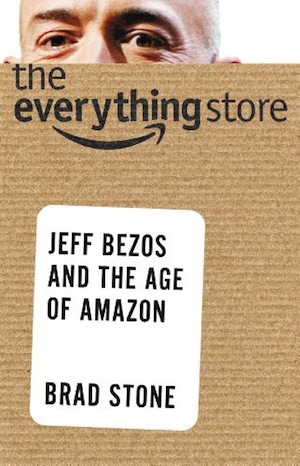|
To see long excerpts from “The Everything Store” at Google Books, click here.
|
“The Everything Store: Jeff Bezos and the Age of Amazon”
A book by Brad Stone
“Explosive.” That’s how the cover of Bloomberg Businessweek bills “The Everything Store” by journalist Brad Stone. That’s an overstatement — but the meticulously reported book has plenty of gems for anyone who cares about Amazon, Jeff Bezos, entrepreneurship, leadership or just the lunacy it took to build a company in less than two decades that now employs almost 90,000 people and sold $61 billion worth of, well, almost everything last year.
From moment one, Bezos, who named his company after the river that “blows all other rivers away,” had what Stone calls a “limitless spring of new ideas,” and Amazon has already seen boom, bust and boom — as well as both fawning adulation and deep skepticism.
Stone recounts how he pitched Bezos on the idea of a book. Bezos — who eventually encouraged friends, family and executives to talk to Stone, but didn’t himself cooperate — asked the author how he was going to deal with the concept of “narrative fallacy.” He was talking about Nassim Nicholas Taleb’s contention in his book “The Black Swan,” which is required reading for all Amazon senior executives, that humans use narrative to turn “complex realities into soothing but oversimplified stories.”
It’s hard to accuse “The Everything Store” of being overly simplistic, perhaps because Bezos defies easy description. While he had an ordinary childhood with his mother and stepfather, his real father was a onetime circus performer whom his mother told to stay out of their lives when Bezos was just 4. (Stone tracked down the lost father and discovered that the man had no idea who his son had become.)
At 3, Bezos took his crib apart with a screwdriver because he insisted on sleeping in a bed.
After graduating from Princeton in 1986, he found his way to the computer-driven hedge fund D.E. Shaw. He walked away before bonus time to found Amazon, helped by what he calls his “regret-minimization framework.” What will be unimportant when you’re 80? And what will you regret?
Bezos comes across as a polarizing figure who has inspired many people but traumatized others. Some of his ideas are so crazy that employees call them “fever dreams,” and his rants are so deranged that internally they are known as “nutters.” Stone describes Amazon’s culture as “notoriously confrontational, and it begins with Bezos, who believes that truth springs forth when ideas and perspectives are banged against each other, sometimes violently.” He can be kind, but is volatile and unsparing of those who make mistakes. Stone collected a list that he calls Bezos’ “greatest hits.” They range from: “Does it surprise you that you don’t know the answer to that question?” to: “Why are you ruining my life?”
He is also a man of many contradictions. While his fans say he is distinguished by his relentless quest for truth, Stone calls the happy platitudes that Bezos generally uses to explain his company to outsiders “Jeffisms.” Internally, top executives who are selected to implement Bezos’ ideas are derisively known as “Jeff Bots,” which is not exactly a sign of a healthy, open corporate culture. Amazon has developed a reputation for incredible ruthlessness, stemming from its less-than-straightforward dealings with publishers along with programs such as “the Gazelle Project,” so named because Bezos once suggested that Amazon should approach small publishers the same way a cheetah approaches a sick gazelle. Stone quotes an observer as saying that Amazon executives “have an absolute willingness to torch the landscape around them to emerge the winner.”
And yet, Bezos recently wrote a memo to his top leadership called Amazon.love in which he talked about the importance of Amazon being a company that is loved, not feared. The business-philosophy book “The Monk and the Riddle” talks about missionaries, who have righteous goals and are trying to make the world a better place, versus mercenaries, who are out for money and power and will run over everything in their way. “I would take a missionary over a mercenary any day,” Bezos says. Of course, most mercenaries think they are missionaries. (Just ask former Enron chief executive Jeff Skilling.)
While Bezos seems to be monomaniacal about his company, he also has absorbing outside interests, including the Clock of the Long Now, which is aimed at measuring time for 10,000 years; his space-exploration company Blue Origin; and most recently, his purchase of The Washington Post. Not incidentally, Bezos made an entirely separate fortune as one of the first investors in Google, which would eventually become one of Amazon’s frenemies.
Nor is Amazon a simple success story. Its stock, which hit a high (adjusted for splits) of almost $107 per share in the first dot-com boom, plunged to below $6 in the wake of the bust — almost living up to the nickname Amazon.bomb, famously bestowed on it by Barron’s — but has since soared to more than $300 per share. The process of getting all of us everything we order, on time, is a fiendishly complex one, and Amazon’s internal systems were worse than anyone ever suspected. Stone recounts how, during the hell of the 1999 holidays, Amazon’s employees staffed customer-service lines and worked in distribution centers, where some later swore the situation was so desperate that they were working among furloughed prisoners. (Stone notes that’s hard to prove.) The entire distribution system got jammed up by a missing pallet of Pokemon Jigglypuffs, which was finally found at 2 a.m.Indeed, Amazon failed at many things it tried, from auctions to venture capital, and at the time of the Barron’s story its internal financial analysis showed that at its rate of spending, the company wouldn’t be profitable for decades. But Bezos, who had been on a relentless quest for growth, was able to do what most of us could never do: rewire Amazon and his own brain to begin a drive for efficiency that ultimately crushed the nonbelievers.
Bezos has never hesitated to do what is impossible for most leaders, like selling products from other merchants alongside his own, a decision that caused a huge amount of corporate infighting but turned the company into a platform for small online merchants. That move, Stone says, “powers a good deal of its success today.” (Bezos was not the least bit disturbed by the internal tension.)
Later, just as Amazon was being categorized as a low-margin retailer, Bezos succeeded — not easily — in transforming it into a true technology company, one that provides basic computer infrastructure such as storage and computing power to other companies. Stone says this business, Amazon Web Services, brought in $2.2 billion in revenue in 2012.
Along the way, Bezos has broken many of the rules about business and leadership in ways big and small. Stone resists the easy Steve Jobs comparison, but Bezos clearly isn’t a joy to work for. There’s a quote that made its way around the company: “If you’re not good, Jeff will chew you up and spit you out. And if you are good, he will jump on your back and ride you into the ground.” The turnover among top executives seems astonishingly high. After a misadventure with a chief operating officer, Amazon to this day has no president or COO.
In a smaller example, Bezos has also done what would be unthinkable in most companies: He has banished PowerPoint presentations because, an acolyte explains, “it is fantastically easy to hide between bullet points.” Bezos, the skeptic of narrative, now requires six-page narratives from his staffers that are written in prose to better stimulate critical thinking.
Stone, perhaps wary of being accused of narrative fallacy, doesn’t draw many grand conclusions, but he is clearly a believer in the company. He writes: “That is its future, to keep weaving and growing, manifesting the constitutional relentlessness of its founder and his vision. And it will continue to expand until either Jeff Bezos exits the scene or no one is left to stand in his way.”
But Stone’s thorough reporting made me wonder if it is still too early to make that call. Past isn’t necessarily prologue. This is the second coming of all stocks tinged with Internet magic, and Amazon trades at a ridiculously high valuation — almost 50 times its past 12 months’ operating profits. Could its uniquely difficult corporate culture withstand another crash, especially given that when companies that have made enemies left and right stumble, they often stumble hard? (This might help explain why Bezos wrote Amazon.love.)
The book’s weakness is that its central character and omnipresent force — “in a way, the entire company is scaffolding built around his brain,” Stone writes of Bezos — is strangely absent. Because he didn’t sit down for interviews, his current thinking about his own and his company’s past is missing. As a reader, you long to know how Bezos rationalizes, or doesn’t, some of the contradictions in himself and his creation. Let’s hope Stone eventually tells that part of the story, too.
Bethany McLean is a contributing editor at Vanity Fair and a co-author of “All the Devils Are Here: The Hidden History of the Financial Crisis.”
©2013, Washington Post Book World Service/Washington Post Writers Group







You need to be a supporter to comment.
There are currently no responses to this article.
Be the first to respond.